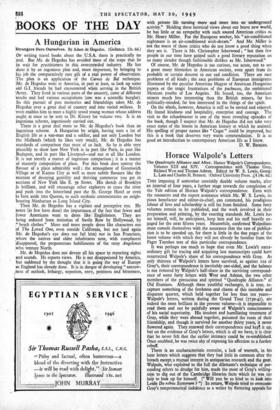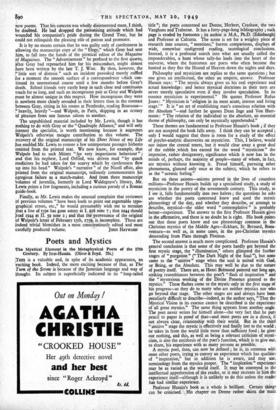Horace Walpole's Letters
The Quadruple Alliance and After. Horace Walpole's Correspondence. Volumes XIII and XIV. Correspondence with Thomas Gray,
Richard West and Thomas Ashton. Edited by W. S. eorge L. Lam and Charles H. Bennett. (Oxford University Press. Lewis,al4s. 6d.) THIS imposing if somewhat unwieldy double volume marks, after an interval of four years, a further stage towards the completion of the Yale edition of Horace Walpole's correspondence. Eyen with the resources and the expert assistance which Mr. W. S. Lewis, its pious benefactor and editor-in-chief, can command, his prodigious labour of love and scholarship is still far from finished. Some forty volumes remain to be published, and the work involved in their preparation and printing, by the exacting standards Mr. Lewis has set himself, will, he anticipates, keep him and his staff heavily en- gaged for the next fifteen years. Meanwhile, confirmed Walpolians must console themselves with the assurance that the rate of publica- tion is to be speeded up, for there is little in the 600 pages of the latest volume with which they will not already be familiar from the Paget Toynbee text of this particular correspondence.
It was perhaps too much to hope that even Mr. Lewis's extra- ordinary gift for tracing and acquiring lost manuscripts could have resurrected Walpole's share of his correspondence with Gray. As only thirteen of Walpole's letters have survived, as against no of Gray's, their correspondence is inevitably one-sided, and the balance is not restored by Walpole's half-share in the surviving correspond- ence of some forty letters with West and Ashton, the two other members of the precocious and spirited "Quadruple Affiance." of Old Etonians. Although these youthful exchanges it is true, re- capture something of the freshness and charm of this unstable and disparate quartet, which held together for less than ten years- Walpole's letters, written during the Grand Tour (1739-41), are indeed the most brilliant in the present volume—it is impossible to read them and not be painfully aware of Walpole's consciousness of his social superiority. His insolent and humiliating treatment of Gray, while they were abroad together, poisoned the roots of their friendship, and though it survived for another thirty years, it never flowered again. They renewed their correspondence and kept it up, but on the evidence of Gray's letters, which is all we have, it is clear that he never felt that the earlier intimacy could be re-established. Once snubbed, he was twice shy of exposing his affection to a further rebuff.
There is an uncharacteristic restraint, a lack of warmth, in his later letters which suggests that they had little in common after the breach except a mutual interest in antiquarian research and the gout. Walpole, who exploited to the full the dilettante's technique of per- suading others to drudge for him, made the most of Gray's willing- ness to dig out of the Cambridge libraries facts which he was too lazy to look up for himself. (" Will you be so kind as to look into Leslie De rebus Scotorum ?") In return, Walpole tried to overcome Gray's temperamental indolence as a writer by flattering appeals for
new poems. That his concern was wholly disinterested must, I think, be doubted. He had dropped the patronising attitude which had wounded his companion's pride during the Grand Tour, but he could not relinquish the pleasing role of patron and promoter.
It is by no means certain that he was guilty only of carelessness in allowing the manuscript copy of the "Elegy," which Gray had sent him, to fall into the hands of the piratical editor of the Magazine of Magazines. The " Advertisement " he prefixed to the first quarto, after Gray had reproached him for his misconduct, might almost have been written by the late T. J. Wise. By then, however, the 1" little sort of distress" such an incident provoked merely ruffled for a moment the smooth surface of a correspondence which con- tinued its unemotional course until a few months before Gray's death. School friends very rarely keep in such close and continuous touch for so long, and such an incongruous pair as Gray and Walpole must be almost unique in this respect. How incongruous they were is nowhere more clearly revealed in their letters than in the contrast between Gray, sitting in his rooms at Pembroke, reading Rousseau- " heavily, heavily "—and Walpole, in Paris, skipping in an ecstasy of pleasure from one famous saloon to another.
The unpublished material included by Mr. Lewis, though it has nothing to do with Gray or the "Quadruple Alliance," and will only interest the specialist, is worth mentioning because it augments Walpole's otherwise meagre contribution to this volume. The recovery of the original manuscript of his Short Notes of my Life has enabled Mr. Lewis to restore a few unimportant passages hitherto 'omitted from the printed text. We now know, for example, that Walpole had to sack Miintz "for very impertinent behaviour " ; and that his nephew, Lord OrfOrd, was driven mad "by quack medicines he had taken for the scurvy which by carelessness flew up into his head." Walpole's " narrative " of the Nicoll affair, also printed from the original manuscript, tediously commemorates his egregious failure as a match-maker. And from three manuscript Volumes of juvenilia, formerly in Lord Waldegrave's library, Mr. Lewis prints a few fragments, including a curious parody of a Roman guide-book.
• Finally, as Mr. Lewis makes the unusual complaint that reviewers of previous volumes "have been loath to point out regrettable typo- graphical errors, etc.," he would presumably wish me to mention that a line of type has gone astray at I. 116 note 7; that ro44 should -ead 1944 at II. 59 note 2; and that the -provenance of the original of Walpole's letter of February t5th, 1759, is incomplete. These are indeed trivial blemishes in a most conscientiously edited and most











































 Previous page
Previous page